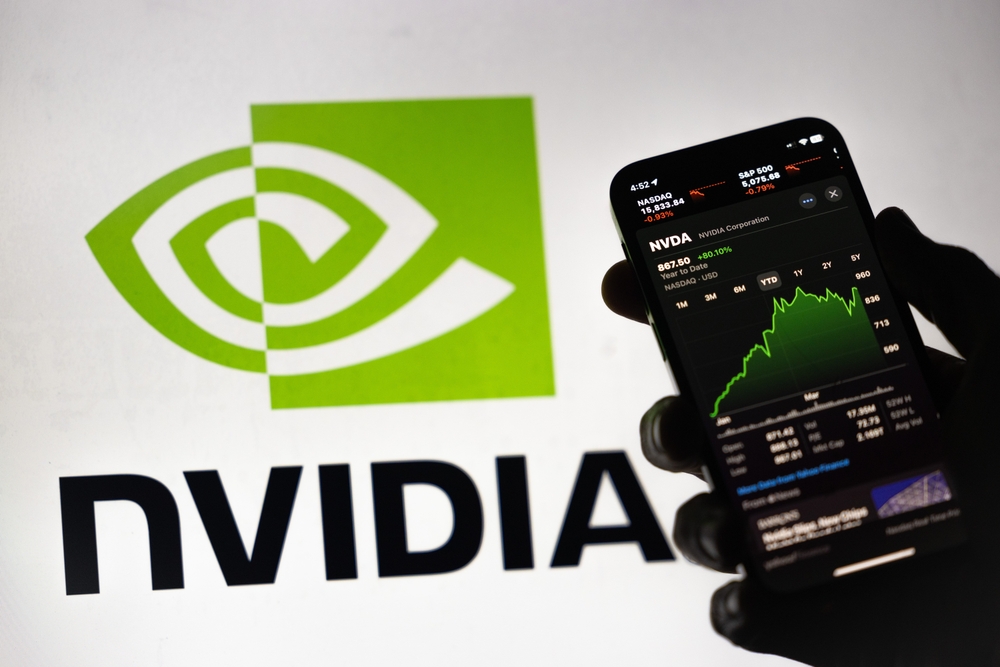Nvidia (NVDA) shares dropped more than 2% on Tuesday as investor concerns mounted over a potential slowdown in AI-related spending. The decline marks a continuation of the chipmaker’s retreat from its record-high closing price of $148.88 in early November. Now down about 14% from that peak, Nvidia faces growing competition, slowing AI investment growth, and regulatory hurdles, which are tempering investor optimism.
From Gaming Giant to AI Powerhouse
Nvidia’s transformation from a gaming graphics card producer to the global leader in AI chips has been remarkable. The company has ridden the wave of Big Tech’s generative AI frenzy, becoming a linchpin for AI infrastructure. This year alone, Nvidia has traded places with Apple (AAPL) as the world’s most valuable company and secured a spot in the Dow Jones Industrial Average (^DJI) by replacing Intel (INTC) in November.
Wedbush analyst Dan Ives projects Nvidia’s market cap will soar to $4 trillion by 2025, reflecting the company’s dominance in the AI chip sector. However, signs of headwinds are now emerging.
AI Investment Growth Slows
Investor caution grew following recent commentary from Microsoft (MSFT) and Google (GOOG), which suggested that their AI spending, while still growing, would do so at a slower pace. JPMorgan analyst Samik Chatterjee noted on Monday that while fears of a major slowdown are “unfounded,” the peak rate of growth may have already occurred. He forecasts hyperscaler AI spending will grow 30% in 2025, down from the 57% surge seen in 2024, and will likely decelerate further to 25% in 2026.
Big Tech’s AI investments are significant but increasingly under scrutiny. Microsoft’s capital expenditures doubled year-over-year to $20 billion in its latest quarter. Meta (META) reported a 36% rise in expenses to $9.2 billion, while Google saw capital expenditures jump 63% to $13 billion. Despite these staggering sums, a Gallup poll cited by Bloomberg found that only 4% of U.S. workers currently use AI on a daily basis, raising questions about the immediate returns on these investments.
Production Delays and Regulatory Challenges
Adding to Nvidia’s struggles, rumors have surfaced about overheating issues with its latest Blackwell AI servers, potentially delaying production ramp-up. These concerns have further weighed on investor sentiment, as the company’s latest stellar earnings report failed to reverse the stock’s downward trajectory.
Nvidia also faces regulatory scrutiny in China, where competition authorities launched an antitrust investigation into its $7 billion acquisition of Mellanox, a networking technology company. Given the ongoing trade tensions and restrictions on AI chip exports, this investigation introduces yet another risk for the company.
Rising Competition in the AI Chip Market
Nvidia’s dominance is also being tested by competitors. Amazon (AMZN) announced earlier this month that it is building a supercomputer powered by its Trainium AI chips, positioning itself as a challenger in the AI hardware space.
Similarly, Broadcom (AVGO) reported a surge in demand for its custom XPUs, securing deals with hyperscalers that could generate as much as $90 billion in revenue over the next three years. While some analysts maintain that Broadcom’s success does not come at Nvidia’s expense, the announcement nevertheless rattled Nvidia’s stock price.
On Tuesday, the PHLX Semiconductor Index (^SOX), which tracks Nvidia and other chipmakers, dipped nearly 2%, reflecting broader unease across the semiconductor sector.
What Lies Ahead for Nvidia and AI Spending?
Despite short-term headwinds, analysts remain cautiously optimistic about Nvidia’s long-term prospects. Chatterjee of JPMorgan emphasized that while growth rates will decelerate, AI infrastructure spending remains on an upward trajectory.
However, investor focus is now on whether Nvidia can maintain its leadership in the face of rising competition, regulatory challenges, and shifting investor sentiment. With AI spending growth slowing and questions lingering about the technology’s adoption rates, the company’s meteoric rise may face its toughest test yet.


